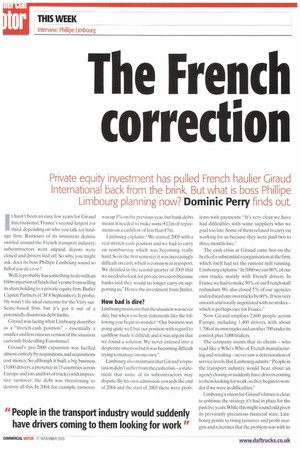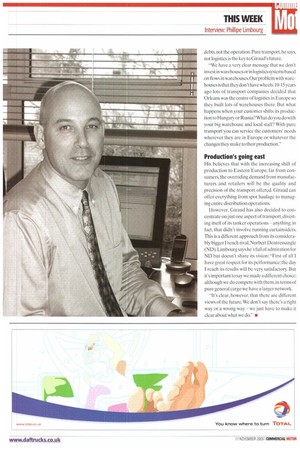The French correction
Page 24

Page 25

If you've noticed an error in this article please click here to report it so we can fix it.
Private equity investment has pulled French haulier Giraud International back from the brink. But what is boss Phillipe
Limbourg planning now? Dominic Perry finds out.
It hasn't been an easy few years for Giraud International, France's second-largest (or third, depending on who you talk to) haulage firm. Rumours of its imminent demise swirled around the French transport industry; subcontractors went unpaid; depots were closed and drivers laid off. So why, you might ask, does its boss Phi Ili pe Limbourg sound so full of joie de vivre'?
Well, it probably has something to do with an €60m injection of funds that's come from selling its shareholding to a private equity firm, Butler Capital Partners (CM 8 September). It probably wasn't the ideal outcome for the Vitry-surSeine-based firm, but it's got it out of a potentially disastrous debt limbo.
Giraud was facing what Limbourg describes as a "stretch-cash position— essentially a smaller and less ruinous version of the situation currently bedevilling Eurotunnel.
Giraud's pre-2000 expansion was fuelled almost entirely by acquisitions, and acquisitions cost money. So although it built a big business (3,000 drivers, a presence in 15 countries across Europe and lots and lots of trucks) with impressive turnover, the debt was threatening to destroy all this. In 2004, for example, turnover was up 3% on the previous year, but bank debts meant it needed to make some €12m of repayments on a cashflow of less than Chin.
Limbourg explains: "We started 2005 with a real stretch-cash position and we had to carry on reimbursing which was becoming really hard. So in the first semester it was increasingly difficult on cash, which is common in transport. We decided in the second quarter of 2005 that we needed to look for private investors because banks said they would no longer carry on supporting us." Hence the investment from Butler.
How bad is dire?
Limbourg maintains that the situation was never dire, but when you hear statements like the following you begin to wonder:"Our business was going quite well but our position with regard to cashflow made it difficult and it was urgent that we found a solution. We never entered into a desperate situation but it was becoming difficult trying to manage on our own, Limbourg also maintains that Giraud's reputation didn't suffer from the cash crisis—a statement that some of its subcontractors may dispute. By his own admission. towards the end of 2004 and the start of 2005 there were prob lems with payments: "It's very clear we have had difficulties with some suppliers who we paid too late. Some of them refused to carry on working for us because they were paid two to three months late.
The cash crisis at Giraud came hot on the heels of a substantial reorganisation at the firm, which itself had set the rumour mill running. Limbourg explains:" in 2000 we ran 80% of our own trucks, mainly with French drivers. In France we had to make 50% of our French staff redundant. We also closed 5% of our agencies and reduced our own trucks by 60%. It was very smooth and totally negotiated with no strikes — which is perhaps rare for France."
Now Giraud employs 2,600 people across Europe, including 1,400 drivers, with about 1,700 of its own trucks and another 700 under its control, plus 3,000 trailers.
The company insists that its clients — who read like a Who's Who of French manufacturing and retailing — never saw a deterioration of service levels. But Limbourg admits: "People in the transport industry would hear about an agency closing or suddenly have drivers coming to them looking for work.so they began to wonder if we were in difficulties," Limbourg's vision for Giraud's future is clear: to continue the strategy it's had in place for the past five years. While this might sound odd given its previously precarious financial state, Limbourg points to rising turnover and profit margins and reiterates that the problem was with its debts, not the operation. Pure transport, he says, not logistics, is the key to Giraud's future.
"We have a very clear message that we don't invest in warehouses or in logistics systems based on flows in warehouses. Our problem with warehouses is that they don't have wheels:10-15 years ago lots of transport companies decided that Orleans was the centre of logistics in Europe so they built lots of warehouses there. But what happens when your customer shifts its production to Hungary Or Russia? What do you do with your big warehouse and local staff? With pure transport you can service the customers' needs wherever they are in Europe or whatever the changes they make to their production."
Production's going east His believes that with the increasing shift of production to Eastern Europe, far from consumers, the overriding demand from manufacturers and retailers will be the quality and precision of the transport offered. Giraud can offer everything from spot haulage to managing entire distribution operations.
However, Giraud has also decided to concentrate on just One aspect of transport, divesting itself of its tanker operations.anything, in fact, that didn't involve running curtainsiders. This is a different approach from its considerably bigger French rival,Norbert Dentressangle (ND). Lirnbourg says he's full of admiration for ND but doesn't share its vision: "First of all I have great respect for its performance; the day reach its results will be very satisfactory. But it's important to say we made a different choice; although we do compete with them, in terms of pure general cargo we have a larger network.
"It's clear, however, that there are different views of the future. We don't say there's a right way or a wrong way — we just have to make it clear about what we do." •






































































































































































































